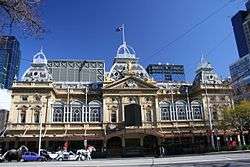Arthur Garner
Arthur Garner (born 8 February 1851) was a theatrical entrepreneur, active in Australia.[1]
Background

Garner was born in Bath, Somerset, England, where his father, Dr. Jonathan Garner (M.D. of Edinburgh) practised his profession, his mother being a Miss Cobden. Arthur Garner was articled to Charles J. Phipps, the architect, whose connection was largely theatrical, he having erected no less than forty English theatres; from which circumstance may perhaps be traced the young pupil's gravitation to the stage, where he became a protégé of Mr. George Gordon, the scenic artist. From the paint-room Garner soon found his way to the footlights, and for some time appeared in various provincial companies.[1]
Early years
In 1873 Garner arrived in Melbourne, returning to London in 1876. In 1879 Garner began his career as an Australian entrepreneur by taking out "The London Comedy Company" (1879), of which Fred Marshall was the bright particular comic star and Mr. George Gordon the hardly less indispensable scenic artist.[1] Garner opened Garner's Theatre (previously White's Rooms) in Adelaide in 1880.[2] In 1881 Garner joined J. C. Williamson, the eminent Australian-American actor, and George Musgrove in establishing the leading firm of Australasian managers, generally known as the "Trio" or "Triumvirate",[3] which has controlled a greater number of theatres and entered into engagements, dramatic and operatic, on a larger scale than has ever been attempted in the southern hemisphere.[1] Their operations practically commenced at the Theatre Royal, Melbourne, on July 1, 1882, with the production of Gilbert and Sullivan's Patience. Many eminent London artistes were introduced to the colonies under their regime; but the most substantial undertaking of Williamson, Garner & Musgrove was the building of the new Princess's Theatre, Melbourne, in 1886, regarded as one of the finest theatres in the world.
Married Life
Garner was twice married: first, to the noted English actress Blanche Stammers, who died in Melbourne in 1883; and, secondly, to Letitia Hill Martin, sister of Patchett Martin, herself an accomplished littérateur, and formerly a contributor to the Australian press.[1]
They retired to England, living at 36 Kempshott-road, Streatham Common, Surrey. He died sometime before 1911.[4]
External links
- Photograph of Garner at State Library, N.S.W.
References
- Mennell, Philip (1892). . The Dictionary of Australasian Biography. London: Hutchinson & Co – via Wikisource.
- "Arthur Garner". AusStage. Retrieved 24 September 2012.
- "Dramatic Notes". The Lorgnette. Victoria, Australia. 3 August 1889. p. 5. Retrieved 9 June 2020 – via Trove.
- "Frederick de Belleville". The Sunday Times (1335). New South Wales, Australia. 20 August 1911. p. 20. Retrieved 3 April 2016 – via National Library of Australia.